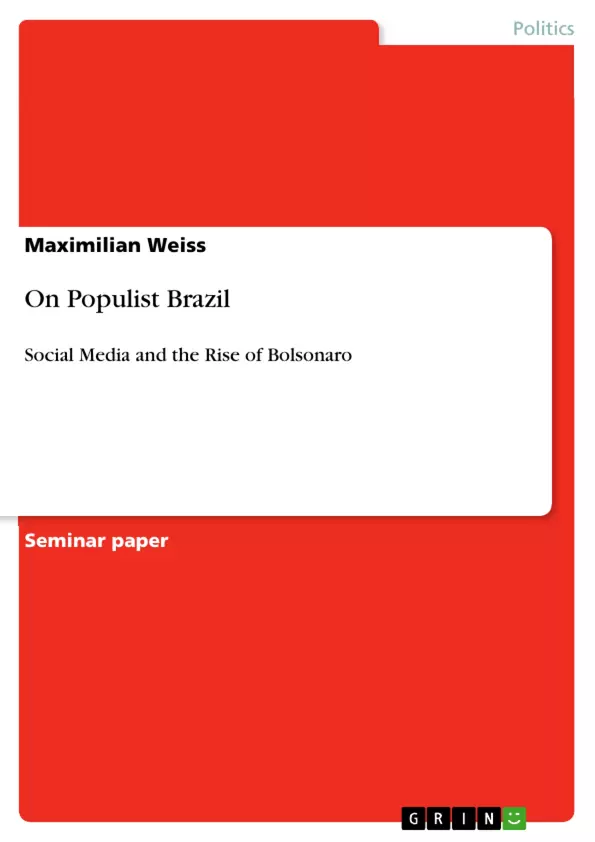Populism has become a central issue of focus for mainstream discourse. The past decade has seen a worldwide rise of populist movements, a phenomenon that has attracted much discussion. The role of the digital revolution in this process is an aspect that has generated particular interest. In “Social media and populism: an elective affinity?” (2018), Paolo Gerbaudo affirms the existence of an elective affinity between social media and populist movements. To develop his thesis, the author presents two different frameworks. First, he argues for social media as the people’s voice, where he points to a decline of the mainstream media (MSM), which has formed a vacuum for new online actors to emerge with an anti-establishment rhetoric coupled with a rebellious attitude that has characterised internet behaviour. Second, he argues for social media as the people’s rally, where he explores the mass networking capabilities of social media and their disposition to favor populist actors.
Inhaltsverzeichnis (Table of Contents)
- Introduction
- From the Fringes to the Mainstream: The Online Dawn of the Brazilian Far-Right
- Social Media as the People's Voice in Bolsonaro's Brazil: Populist Narratives and a Crisis of Authority
- Social Media as the People's Rally in Bolsonaro's Brazil: Filter-Bubbles, the Network Effect and Online Crowds
- Conclusion
Zielsetzung und Themenschwerpunkte (Objectives and Key Themes)
This paper aims to explore the rise of Jair Bolsonaro in Brazil and analyze the role social media played in his success. The paper specifically examines the elective affinity between social media and populist rhetoric as outlined by Paolo Gerbaudo in "Social media and populism: an elective affinity?" (2018).
- The emergence and influence of Brazilian far-right YouTubers
- Social media as a platform for populist narratives and a crisis of authority in the Brazilian mainstream media
- The role of social media in mobilizing online crowds and facilitating the spread of populist ideas
- The impact of the 2013 protests and subsequent political crisis on the rise of the Brazilian far-right
- The relationship between the online far-right and Jair Bolsonaro's political career
Zusammenfassung der Kapitel (Chapter Summaries)
- Introduction: This chapter sets the stage by introducing the phenomenon of populism and its association with social media. It highlights Gerbaudo's theory of an elective affinity between social media and populist movements, outlining his two main arguments: social media as the people's voice and social media as the people's rally. The chapter then focuses on the case of Jair Bolsonaro in Brazil, emphasizing his rise to prominence through social media and his connection to the Brazilian far-right.
- From the Fringes to the Mainstream: The Online Dawn of the Brazilian Far-Right: This chapter delves into the rise of the Brazilian far-right online, focusing on the influence of YouTubers like Nando Moura and Olavo de Carvalho. It discusses the role of online platforms like YouTube in promoting far-right content and the emergence of a Brazilian version of the "intellectual dark web." The chapter also explores the impact of the 2013 protests and subsequent political crisis on the rise of the far-right in Brazil, highlighting the increasing influence of social media in national politics.
- Social Media as the People's Voice in Bolsonaro's Brazil: Populist Narratives and a Crisis of Authority: This chapter examines Gerbaudo's argument about social media as the people's voice in the context of Bolsonaro's movement. It analyzes how the perceived crisis of authority in the Brazilian mainstream media, coupled with the anti-establishment sentiment associated with online behavior, facilitated the rise of Bolsonaro. The chapter explores how Bolsonaro leveraged social media to bypass traditional media outlets and connect directly with his supporters.
Schlüsselwörter (Keywords)
The key terms and concepts explored in this text include populism, social media, online political discourse, far-right, YouTube, Jair Bolsonaro, Olavo de Carvalho, Brazilian mainstream media, crisis of authority, anti-establishment sentiment, network effect, online crowds, filter-bubbles, and the 2013 protests in Brazil.
Frequently Asked Questions
How did social media contribute to Jair Bolsonaro's rise?
Bolsonaro used social media to bypass traditional media, connecting directly with supporters through populist narratives and anti-establishment rhetoric.
What is the "elective affinity" between social media and populism?
The theory by Paolo Gerbaudo suggests that social media's structure naturally favors populist movements by acting as the "people's voice" and a platform for mass networking.
Who were the key online influencers for the Brazilian far-right?
YouTubers like Nando Moura and philosophers like Olavo de Carvalho played a significant role in promoting far-right content and creating an online political crowd.
What was the impact of the 2013 protests on Brazilian politics?
The 2013 protests and the subsequent political crisis created a vacuum and a crisis of authority in mainstream media, allowing new online actors to emerge.
What are "filter bubbles" in the context of Brazilian populism?
They refer to online environments where users are only exposed to information that reinforces their existing beliefs, facilitating the spread of populist ideas within closed networks.
- Citation du texte
- Maximilian Weiss (Auteur), 2020, On Populist Brazil, Munich, GRIN Verlag, https://www.grin.com/document/914633



